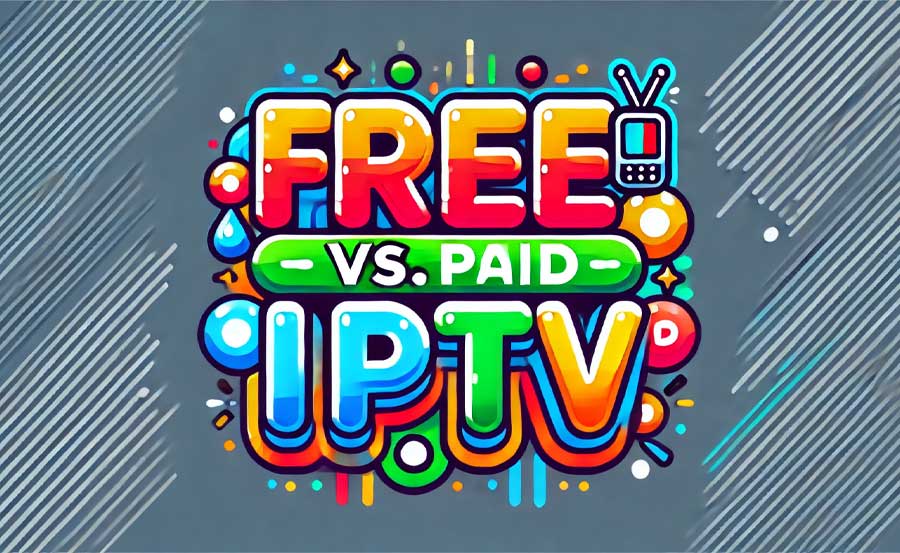As IPTV (Internet Protocol Television) continues to gain momentum, users are often faced with the choice between free and paid services. While both options can provide access to a wide array of TV channels, on-demand content, and even live broadcasts, they each come with unique advantages and disadvantages. This article will explore the pros and cons of free versus paid IPTV services, helping you make an informed decision about which option best suits your needs.
Buy 6 Months IPTV for Endless Entertainment
Free IPTV Services: Advantages and Disadvantages
Pros:
- No Cost
The most obvious benefit of free IPTV services is that they are completely free. This makes them an attractive option for budget-conscious users who don’t want to commit to monthly subscriptions. With free IPTV, you can access a variety of channels without spending any money. - Wide Channel Selection
Some free IPTV services offer a diverse selection of international and local channels. These services are ideal for users who want access to niche content, sports events, or live news broadcasts from different parts of the world. - No Contracts or Commitments
Free IPTV services don’t lock you into any contracts or long-term commitments. Users can explore different platforms and easily switch between services if one doesn’t meet their expectations.
Cons:
- Unreliable Streaming Quality
One of the biggest drawbacks of free IPTV services is the inconsistency in streaming quality. Since free IPTV providers often rely on unstable servers, users may experience frequent buffering, interruptions, and lower resolution streams, which can make watching live events frustrating. - Limited Content Availability
While free IPTV services offer a decent variety of channels, their content libraries tend to be more limited compared to paid options. Many premium or popular channels may not be available, and there could be fewer on-demand viewing options.Future Trends in IPTV: What to Expect in the Next Decade - Legal Concerns
Free IPTV services often operate in a legal gray area. Some may provide unauthorized access to copyrighted material, which can result in legal issues for users. It’s important to be cautious when using free IPTV to avoid potential risks related to piracy. - Lack of Support and Updates
Free IPTV services generally lack customer support, and they may not receive regular updates. If the service encounters technical issues, users are left without assistance, which can disrupt the viewing experience.
Paid IPTV Services: Advantages and Disadvantages
Pros:
- Higher Quality Streams
Paid IPTV services typically offer higher quality streams, including HD and 4K options. They often use more reliable servers and have the capacity to support a large number of users without issues like buffering or lagging. For users seeking consistent, high-definition viewing, paid IPTV is a superior option. - Extensive Content Libraries
Paid IPTV providers offer an extensive library of channels, on-demand content, and premium entertainment options. Subscribers can access everything from live sports events to the latest movies and popular TV series. Many paid services also feature channels that are not available through free IPTV platforms. - Legal and Secure
Most paid IPTV services are fully licensed, ensuring that users are accessing content legally. This eliminates the risk of legal action for watching unauthorized material and provides peace of mind to subscribers. - Customer Support and Regular Updates
Paid IPTV services usually come with customer support, meaning users can get assistance if they encounter technical issues. In addition, these services frequently update their content libraries, user interfaces, and streaming technology to provide a seamless viewing experience.
Cons:
- Subscription Costs
The primary drawback of paid IPTV services is the cost. Subscription fees can vary significantly depending on the service and the range of content offered. For some users, these costs may add up if they subscribe to multiple services or pay for premium features. - Contracts or Terms
While some paid IPTV services offer flexible monthly subscriptions, others may require longer-term commitments, such as yearly contracts. These commitments can be limiting if users want to switch providers or discontinue their subscription.IPTV Explained: A New Era of Television Streaming - Geo-Restrictions
Paid IPTV services are sometimes subject to geographic restrictions, meaning certain content may not be available in all regions. Users may need to use VPNs (Virtual Private Networks) to bypass these restrictions, which can add extra costs and setup complexity.
Which Option Is Best for You?
The decision between free and paid IPTV services ultimately depends on your individual needs and preferences.
- If you prioritize cost savings and don’t mind potential streaming issues or limited content, free IPTV may be a good option. It’s an excellent way to explore IPTV without making a financial commitment.
- If you value streaming quality, variety, and legality, paid IPTV is the better choice. With high-definition streams, vast content libraries, and access to premium channels, paid services deliver a more reliable and comprehensive viewing experience.
Conclusion
Both free and paid IPTV services offer distinct advantages and challenges. Free IPTV can be a cost-effective solution for casual viewers, but it comes with risks related to stream reliability and legality. On the other hand, paid IPTV services provide higher quality, security, and support, making them ideal for users who want a hassle-free, premium experience. When deciding between the two, consider what’s most important to you: cost, content variety, or viewing quality.

